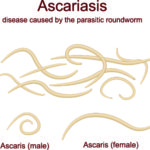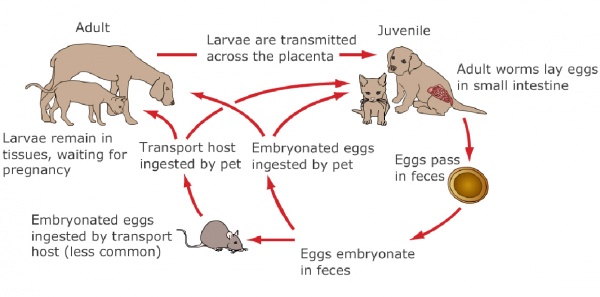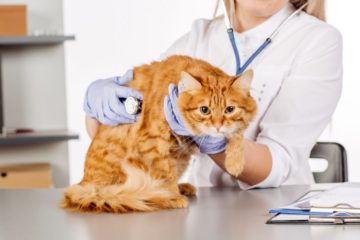Ascariasis is a disease caused by the parasitic roundworm.
Nematodes (or roundworm) usually parasitic on cats include ascarids (Ascaris), filariasis, hookworms (Dirofilaria immitis), Toxocara cati, pinworms (Enterobius vermicularis), and whipworms (Trichuris trichiura). Ascaris inhabits the stomach and bowels and appears to do little damage unless present in fairly large numbers. It is a thin, roundworm, white or cream colored, from 2 to 5 inches long. The head bears a couple of wing-like appendages which start from the terminal mouth and broaden out at their rear. 
 In any animal in which this worm is present, a search of the bowel contents will reveal numerous minute spherical eggs, which also are usually found in the feces.
In any animal in which this worm is present, a search of the bowel contents will reveal numerous minute spherical eggs, which also are usually found in the feces.
They thus often become enmeshed in the fur about the hind legs and anus of the affected cat, and if the latter be nursing a litter of kittens, this fact will explain how the newly born may manifest signs of early worm infection, leading their parent to believe the condition is congenital. 
Symptoms.
It is not uncommon for the ascarids (roundworm) to invade the stomach when they nearly always cause vomiting and become expelled in the vomit. Occasionally they have been suspected of setting up a gastrointestinal catarrh, with diarrhea and sickness; and in rare instances of causing severe tenesmus followed by invagination, inflammation, ulceration, or prolapse of the bowel.
 One more common symptom is associated with a staring coat, unthriftiness, and capricious appetite. Another roundworm’s symptom which has been several times observed is a sudden movement of the cat, as if frightened or pricked with a pin. The cat, which is, perhaps, sitting quietly by the fireside, will suddenly jump up, stare into space, run under furniture to hide, or merely make rapid movements preparatory to flight, and then resume its normal posture.
One more common symptom is associated with a staring coat, unthriftiness, and capricious appetite. Another roundworm’s symptom which has been several times observed is a sudden movement of the cat, as if frightened or pricked with a pin. The cat, which is, perhaps, sitting quietly by the fireside, will suddenly jump up, stare into space, run under furniture to hide, or merely make rapid movements preparatory to flight, and then resume its normal posture.
Roundworm In kittens and some adult cat, common clinical signs also include:
- A pot-bellied appearance.
- Abdominal discomfort.
- Depressed appetite
- Vomiting and diarrhea, or poor growth.
Treatment
Luckily, the treatment for roundworms is actually safe, simple, and rather inexpensive. After administration of the vermicide or deworming therapy, the dead and dying roundworms pass into the stool. At least two or three treatments are needed since none of these treatments will kill the immature forms of the worm or the migrating larvae; they are typically performed at two to three-week intervals. Perfectly, kittens are dewormed with each visit for vaccinations. The veterinary may wish to assign periodic doses of an anthelmintic If your adult cat goes outdoors. 
The pregnant queen should not be dosed within about two weeks of parturition, and if she is treated, the process should be carried out in some place well removed from that in which she is to kitten, so as to avoid the expulsion of worms or eggs in a situation from which they might later be directly ingested by the young ones.


